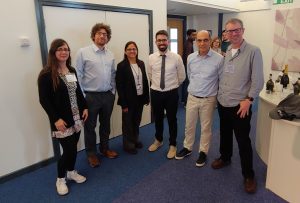News Story
ANGELO succeeds his viva
Tuesday 4 Jun 2019
Congratulations to Angelo Salatino for succeeding in his viva!
Last Friday, Angelo Salatino successfully defended his PhD thesis on Early Detection of Research Trends. The thesis is a body of research work over the last three years leading to a successful system that identifies the emergence of new research topics up to two years before they emerge (i.e., at their embryonic stage). The work in the thesis would allow relevant stakeholders (e.g., companies, funding bodies, academic editors, and researchers) to quickly react to developments in the research landscape. Indeed, this research has been sponsored by Springer Nature.
The more general research question that drove Angelo’s thesis was on whether, and how, it is possible to detect the emergence of new research topics in their embryonic stage before it is consistently recognised by a research community.
The thesis answers this question by developing Augur, a framework for identifying the appearance of new topics at an embryonic stage. Specifically, Augur analyses networks of research topics, detects areas exhibiting a significant increase in the pace of collaboration, and produces clusters of topics correlated with the future emergence of new research areas. For instance, if available, before 2001, Augur would have allowed us to observe that previously less connected topics (e.g., Artificial Intelligence, World Wide Web and Knowledge-Based Systems) were increasingly collaborating with each other.
Angelo was supervised by Prof Enrico Motta and Dr Francesco Osborne. The exam panel was chaired by Dr Pallavi Anand from the Open University, and consisted of Prof Kalina Bontcheva from the University of Sheffield, and Prof Alun Preece from Cardiff University.
About his viva, Angelo says: “I am very grateful to the whole panel, they made me feel comfortable during the viva. Also, the examiners gave me interesting feedback. It was an interesting discussion indeed.”
We congratulate him once again for this success and we wish him all the best in his career.
References
- Angelo A. Salatino, Francesco Osborne, and Enrico Motta. “AUGUR: Forecasting the Emergence of New Research Topics.” In JCDL ’18: The 18th ACM/IEEE Joint Conference on Digital Libraries, June 3-7, 2018, Fort Worth, TX, USA
- Angelo A. Salatino, Francesco Osborne, and Enrico Motta. “How are topics born? Understanding the research dynamics preceding the emergence of new areas.” PeerJ Computer Science 3 (2017): e119.
- Angelo A. Salatino, and Enrico Motta. “Detection of Embryonic Research Topics by Analysing Semantic Topic Networks.” International Workshop on Semantic, Analytics, Visualization. Springer, Cham, 2016.
- Angelo A. Salatino. “Early Detection and Forecasting of Research Trends.” ISWC-DC 2015, The ISWC 2015 Doctoral Consortium (2015): 49.
Latest News
KMi at the Palace of Westminster: Exploring Blockchain for Society and Economy
OUAnalyse at the Digital Ethics Summit 2025: Advancing Responsible AI in Education

